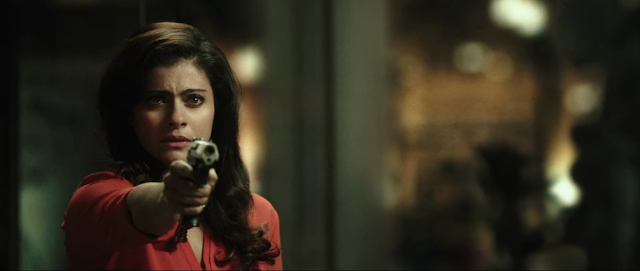I am perhaps America's only unironic Johny Lever fan. I get why a lot of Bollywood fans don't like him; the man has built his career on incredibly broad comic relief and frenetic impressions, and his acting range goes from chewing the scenery to nibbling on the camera lens, but he's really good at incredibly broad comic relief. In a movie like Cirkus (2022), in which everybody is overacting at the same level, you get a sense of just how good Lever is at being Johny Lever.
The movie starts with Doctor Roy Jamnadas (Murali Sharma) expounding on his theories of nature versus nurture. Roy is strongly Team Nurture, perhaps influenced by his own upbringing in Jamnadas Orphanage, which he now runs with his adopted brother Joy (Uday Tikekar). When two pairs of twins arrive at the orphanage, Roy sees a chance to demonstrate his theories, and so he swaps babies, placing one twin from each pair in a set. Both sets of twins are adopted, one by a well-to-do couple in Bangalore, and one by a couple who run a circus in Ooty. Both sets of grateful adoptive parents decide to name their children Roy and Joy, after the people who made this adoption possible.
Doctor Roy keeps close tabs on both sets of Roys and Joys as they are growing up. His plan is to reveal the truth to them when they turn thirty, finally proving to the world at large that it is upbringing rather than blood which shapes personality, a fact which has been amply demonstrated by countless adoptive children throughout the history of the world. This is, of course, enormously unethical and will cause a lot of damage over the years to these hapless kids, and the movie never really calls him out on it.
The Roy and Joy in Ooty grow up as brothers in the circus. As a child, Roy demonstrates a strange power - he can grab electric wires without being shocked. After the death of their parents, the brothers grow up and run the circus, with Roy (Ranveer Singh) billing himself as the Electric man, while Joy (Varun Sharma) has a high wire act. Despite the show business career, Roy is a confident and mature man, married to Mala (Pooja Hegde), who writes mystery novels under the name of "Colonel Vikrant." The couple's one point of conflict is that Mala wants to adopt a child, but Roy is reluctant; he doesn't know that he's adopted, and believes that only a child of his own blood will be dedicated enough to take over the circus.
The other Roy and Joy, meanwhile, grew up to lead a life of privilege, watched over by their adoptive mother Shakuntala Devi (Ashwini Kalsekar). Roy suffers from a mysterious ailment that causes him to receive electric shocks at seemingly random times, leading to him shocking the people around him in inconvenient and comic ways. He's also naturally a bit suspicious, largely because he spends much of his time reading the mystery novels written by Colonel Vikrant. Roy wants to marry the beautiful Bindu (Jaqueline Fernandez), but her father (Sanjay Mishra) is certain that he's seen Roy with another woman in Ooty.
When the Roy and Joy from Bangalore travel to Ooty to close a deal for a tea plantation, it leads to a comedy of errors. Actually, it leads to The Comedy of Errors, since the plot is lifted almost directly from Shakespeare's play. While Roy and Joy and Joy and Roy are getting their Shakespeare on, Doctor Roy follows from a distance and doesn't do anything to help, and both sets of brothers are bothered by a trio of incompetent gangsters led by Momo (Siddhartha Jadhav), who has magnificent hair and is doing his best Johny Lever impression. Momo is working for the crimelord Poison Dada, who also has magnificent hair and is played by actual Johny Lever.
Cirkus is set in the sixties, largely because it's secretly a prequel to director Rohit Shetty's Golmaal Again, which is doubly weird because the Golmaal series has no continuity between films beyond character names and supporting cast, and now suddenly we've got a Jamhadar Orphanage Cinematic Universe.
In any case, Cirkus takes full advantage of its time period. The movie is a deliberate throwback to the comedies of the era, and lifts a lot of the incidental music from those movies. The costumes are wonderful, and while it's not really a period thing, the scenery in Ooty is spectacular. This may be a broadly comic bit of fluff, but it's a gorgeous broadly comic bit of fluff.
It's still a bit of fluff, though. Johny Lever is the best at being Johny Lever, but everybody does their best, and Pooja Hegde manages to sneak in a bit of genuine acting when nobody is paying attention. I would say that it's hardly Shakespeare, but it is absolutely Shakespeare. Very much so.
.png)
.png)
.png)
.png)
.png)
.png)
.png)
.png)
.png)
.png)
.png)
.png)
.png)
.png)
.png)
.png)
.png)
.png)
.png)
.png)
.png)
.png)















